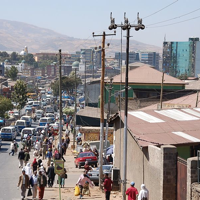In 1999, Amartya Sen, an Indian economist who a year earlier had won the Nobel Prize for Economics, published "Development as Freedom." Sen mapped out two arguments for a general audience. First, he defined economic development as the expansion of individual freedom, challenging "narrower" views that reduced development to GNP growth or a rise in personal incomes. Sen's ideas spurred the creation of the U.N. Human Development Index, which created a composite measure of development that included income, health and education. Second, Sen maintained that democratic political arrangements, defined as the existence of civil and political freedoms, were necessary to achieve these broadly defined development goals. In his view, open public debates and discussions enabled societies to identify and respond to acute economic needs. As evidence, Sen invoked the history of famines, arguing that "no substantial famine has ever occurred in any independent country with a democratic government and a relatively free press."
Scholars from multiple disciplines -- economics, moral philosophy and political science -- reviewed the book and praised its wide-ranging insights and moral imagination. But only one writer, the philosopher Avishai Margalit, who reviewed the book for the New Republic, identified one of its most important contributions: Sen's defense of democracy as not only intrinsically valuable, but also instrumentally useful for development. For Margalit, Sen's consequentalist argument was "admirably firm" and one of his "most forceful claims."
Viewed in retrospect, Sen's book was an early liberal response to East Asia's astonishing economic growth, and more specifically to the argument that the region's growth was indisputable evidence that civil and political liberties were luxuries poor countries could not afford. Sen did not conceal his motives. In the key chapter on democracy, he criticized the proceedings of the 1993 Vienna Conference on Human Rights, in which delegates of developing countries -- led by China and Singapore -- argued against liberal democratic rights in the developing world on the grounds that such countries should instead focus on material needs. Sen recognized that the surging tide of Asia's economic growth could sweep away the philosophical justification for democracy. His arguments helped to fortify democracy against its critics.

